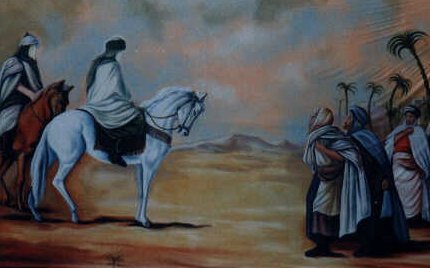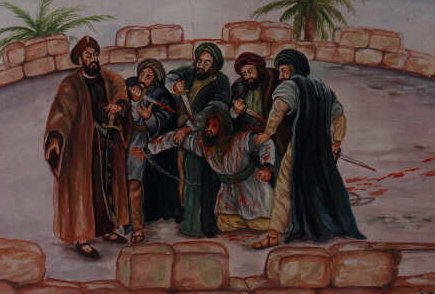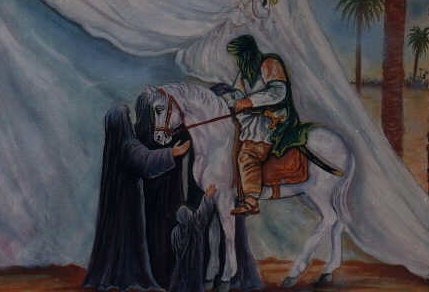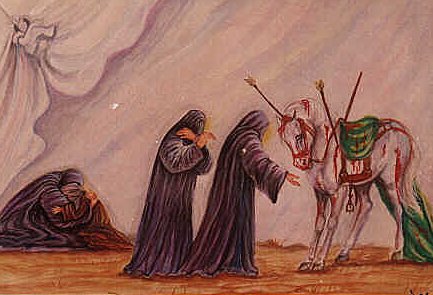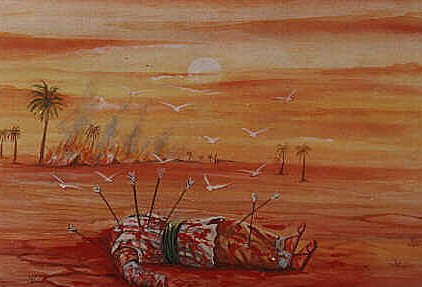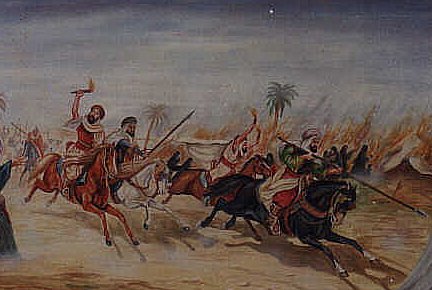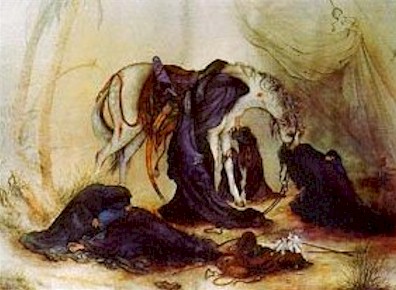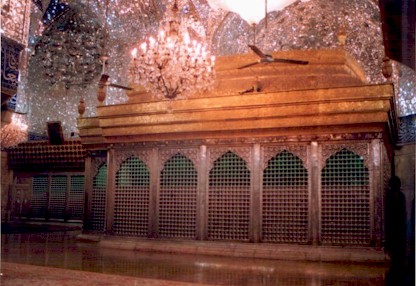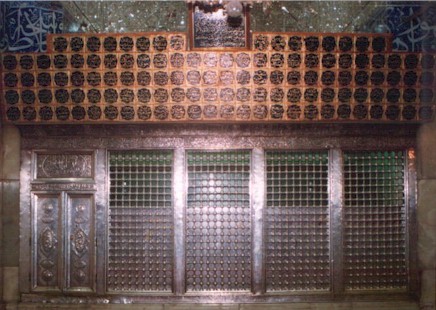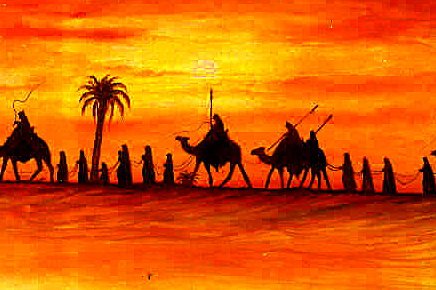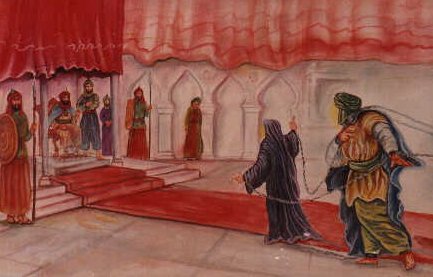The Son of the Prophet
Imam Hassan Mujtaba (as) was the second Imam. He and his brother Imam Hussein were the two sons of Amir al-mu"minin Ali and Hadhrat Fatimah, the daughter of the Prophet. Many times the Prophet had said,"Hassan and Hussein are my children". Because of these same words Ali would say to his other children, "You are my children and Hasan and Hussein are the children of the Prophet."Imam Hassan was born in the year 3 A.H. in Medina and shared in the life of the Prophet for somewhat over seven years, growing up during that time under his loving care.
After the death of the Prophet which was no more than three,or according to some, six months earlier than the death of Hadhrat Fatimah,Hassan was placed directly under the care of his noble father.
The beginning of Imam Hasan's (A) Imamat
The Holy Imam (A) helped his father throughout his life until Imam Ali (A) died when the Holy Imam (A) was 37 years old. At this age he inherited his father and became the guardian of the Ahlul Bayt and the Shia. In his well-known will Imam Ali (A) appointed him as the next Imam.
The martyrdom of Imam Ali (A) on the 21st of Mahe Ramadhan, 40 A.H. marked the beginning of Imam Hasan's (A) Imamat. The Muslims pledged their allegiance to him and finalised the formality of Bay'at (Oath of Allegiance). No sooner had he taken the reins of leadership in his hands than he had to meet the challenge of Muawiya bin Abu Sufyan, the governor of Syria, who began trying to undermine his authority. The Holy Imam (A) decided that Muawiya would have to be ousted by force and he prepared for war. He appointed a representative in Kufa and proceeded to Nukhayla where he had asked the army to gather. After 10 days, only 4,000 men had assembled, so he went back to Kufa and made another call for people to come to arms, sending out Hujr bin Adi to do the same.
Slowly the people answered the call for Jihad. A mixed band of people formed the army. Some were sincere Shia, others were Kharjites who wished to fight Muawiya by any means possible, some were men who loved fighting and desired war booty, some were unsure about the right of the Holy Imam (A) to the Caliphate, while others blindly followed their tribal leaders with no thought for religion.
The Holy Imam (A) gave an address to the army in which he first praised Allah and the Holy Prophet (S). He then told the people that he was their sincere advisor and urged them to unite rather than be divided in factions. This message was misunderstood by some, who thought that he planned to hand over authority to Muawiya. There was a riot amongst the people and a group of them attacked the Holy Imam (A) while he was in his tent. The Shia gathered around him and protected him.
Later, during the march towards Syria, a man from the Bani Asad attacked the Holy Imam (A) and struck him on the thigh with an axe. Due to the injury, the Holy Imam (A) was forced to stop at Mada'in, from where he sent Ubaidullah bin Abbas with 12,000 men to stop Muawiya, who had advanced into Iraq.
Muawiya managed to bribe and threaten many of the Holy Imam's (A) followers into abandoning him, including Ubaidullah, who was paid one million dirhams to betray the Holy Imam (A).
The Holy Imam (A) realised that he could not trust the intentions of most of his men and the only people he could rely on were his Shia, who were too few to resist the Syrian soldiers. Meanwhile, Muawiya wrote to him suggesting a truce and
Peace Treaty on the Holy Imam's (A) terms.
Muawiya was still not satisfied with affairs. He knew that the treaty was never meant as a surrender of authority by the Holy Imam (A), because he was Divinely Appointed as the Imam.
It was merely an interim transfer of the administration of the Islamic State, subject to the condition that it would be returned to the Holy Imam (A) after Muawiya's death and then it would be in turn inherited by Imam Husain (A). However, Muawiya had plans to declare Yazid, his son, as his successor, and he decided to get rid of the Holy Imam (A) first.
Imam Hassan’s Character
In human perfection Imam Hassan was reminiscent of his father and a perfect example of his noble grandfather. In fact, as long as the prophet was alive, he and his brother were always in the company of the Prophet who even sometimes would carry them on his shoulders.
Both Sunni and Shiite sources have transmitted this saying of the Holy Prophet concerning Hassan and Hussein:"These two children of mine are Imams whether they stand up or sit down" (allusion to whether they occupy the external function of caliphate or not).
The researcher who examines the life of the
Holy Prophet’s grandson,
Imam Hassan and his brother,
Imam Hussein (as),can’t help drawing the conclusion that they enjoyed a high level of education and spiritual and ideological upbringing, which no other person had won next to their grandfather (pbuh),mother and father (as).
The imprints of the revelation and Divine care marked their characters, in all its aspects, ingredients and angles.
They were highly refined and brought up in line with Islam’s teachings by their grandfather, the Messenger of Allah (s.a.w.), their father,
Imam Ali (a.s.), and their mother
Fatima (a.s.) , through excellent examples and direct daily guidance. Although they lost both their grandfather and mother at an early age, their upbringing suffered no interruption. Their father,
Imam Ali bin Abi-Talib(a.s.), the disciple of the Messenger of Allah (s.a.w.), and the graduate from the school of Divine revelation, who was the beacon for the people, was alive, throwing his shade over them. There is no doubt that
Imams Hassan and
Hussein (a.s.) wound up in the stage of Divine preparation.
They were prepared to shoulder the responsibility of the Divine message, in form and content. The ultimate result was that both Imams Hasan and Hussein (a.s.) became Islam personified walking on the earth.
As the ingredients of the characters of the two Imams were the same, they were singular in their behavior, march, steps and goals, which were Islamic in their entirety.The nature of our discussion dictates that we present lively examples from Imam Hassan’s (a.s.) spiritual, scientific, and ethical activities.
1. Spiritual Side:
The excellent preparation which was provided for the grandson of the Holy Prophet (s.a.w.), helped his spiritual entity to sublimate. His closeness to Allah, and his attachment to Him was a source of awe and respect.
Following are a few narratives which shed light on this side of his character:
Imam al-Sadiq (a.s.) said:
"Hassan bin Ali (a.s.) was certainly the most true worshipper, ascetic and merited man among the people of his time."
Ali ibn Jadh’an, and Abu-Na"im report in Helyat al-Awaliya" (Ornament of the Saints) and Tabaqat ibn Sa"d that Imam Hasan had given all his money to the needy twice, seeking Allah"s pleasure, and had given half his money to the needy three times. He would even give a single shoe and retain the other, and give a single sandal and retain the other. When he approached the door of the mosque, he would say. "O Lord! Your guest is at Your gate. O Generous! The transgressor has come to You. Forgive me my ugly deeds with Your Generosity. O Generous!"
2. Scientific Side:
All of the rightly guided Imams either received their education directly from the Messenger (s.a.w.) or indirectly from the preceding Imam.
As for the new questions and developments of life, the sublime, inner entity of the Imam himself, and his boundless spirituality, qualified him for self-acquired knowledge. That is why the Muslim orators dubbed the knowledge of the Imams, from the perspective of the "present knowledge". An Imam wouldn’t need to be tutored or taught by others in this respect. He acquired knowledge by means of direct inspiration.
Following are a number of reports about Imam Hasan"s vast knowledge.
A. Hasan al-Basri wrote to Imam Hassan (a.s), asking him about the Divine decree. The grandson of the Messenger of Allah (s.a.w.) answered him in these words:
"Mind you, he who does not believe that all sudden incidents that happen, be they good or bad, are known earlier by Allah, is an infidel. He who blames sins on Allah, is unchaste. Allah is not obeyed against His will. He is not sinned against by force. He does not leave aside His servants in His Kingdom. He is the Owner of what He gives to them. He is the Powerful over whatever He puts at the disposal of them. Nay, He orders them with no coercion, and prohibits them as a warning. If they opt to obey Him, none would stand in their way, and if they choose to sin, He may prevent them from doing it. But if He does not, He is not to blame, because it is not He Who forces them to do it, or compels them into committing it against their will. But He does them a favor by opening their eyes, teaching, warning, ordering and prohibiting them. He does not force them to do what He orders, so as to be like the angels, not does He pressure them to keep away from what He forbids. Allah"s is certainly the conclusive argument. If Allah willed, He would have guided you to the right path..."
B. "
What is asceticism?" the Imam was once asked.
"The desire to be pious and abstemious in this life," he replied.
"What is forbearance?" he was asked.
"Restraining one"s anger and controlling oneself," he answered.
"What is righteousness?" he was asked.
"Replacing the bad with the good," he answered.
"What is honor?" they asked.
"Being kind to one’s relatives and shouldering people’s burdens of sin."
"What is the succour?" he was asked.
"Defending the neighbor, patience in war, and advance during adversities," he said.
"What is glory?" he was asked.
"Giving while being in debt and forgiving others their offences."
3. Ethical Side:
Covering this aspect of the character of the grandson of the Prophet (s.a.w.) by no means signifies a difference among the guiding Imams (a.s.) in this respect, or in any other ingredient of the ideal Islamic character.
They are equal in this. We will confine ourselves to presenting some narratives of the Imam’s behavior with the people.
A. His Modesty:
1. It is reported that he once chanced upon some poor men who put a few crumbs of bread on the ground in front of them, which they had earlier picked up from the road. They were eating them. They invited him to eat with them. He accepted the invitation and said: "Certainly Allah does not like the proud."
Having finished eating with them he invited them to his house. He showered them with money, fed and clothed them.
2. It is reported that he was sitting in some place. When the Imam (a.s.) rose to go, a poor man came in. The Imam greeted him, and spoke kindly to him. "You have come at the time when I was taking leave," he said to the man. "Do you permit me to go?" "Yes, O son of the Messenger of Allah," replied the man.
B. His Kindness to the Wrongdoers:
A Syrian, imbued with hatred and spite against the family of the Messenger of Allah (s.a.w.), by Mu’awiyah bin Abi-Sufyan, once saw the Imam on horseback. He at once emitted a series of curses! Imam Hasan (a.s.) did not put in a word of protest or interruption. When the man finished, Imam Hasan (a.s.) approached him with a tender smile. He said to him:
"O old man! I think you are a stranger here. Maybe you mistook me for someone else? If you propitiate us, we will satisfy you. If you ask us, we will give you what you need. If you ask our advice, we will guide you. If you ask us to give you a ride, we will take you with us. If you are hungry, we will satisfy you. If you are naked, we will clothe you. If you are in need, we will make you rich. If you are a refugee, we will give you lodgings. If you have a request, we will grant it. If you join your luggage to ours, and be our guest until the time of your travel, it will be more useful to you, because we have a spacious place, a good social position, and a vast amount of money."
Upon hearing these words, the Syrian broke into tears.
Then he said: "I bear witness that you are the viceroy of Allah on the earth. Allah knows best whom to entrust with His message. You and your father were the most hateful creatures of Allah to me. But now you and your father are the most beloved from among all the creatures of Allah to me."
Then the Imam took the Syrian to his house as his guest till the time of his departure. The man had completely changed his opinion and position toward
Ahlul-Bait (a.s.).
C. His Generosity:
Maybe the most eminent of Imam Hassan’s (a.s.) attributes is his generosity. He believed that money was only a means to clothe the naked, help the destitute, pay the debts of the indebted, or satisfy the hungry. Once, he was asked: "We do not see you disappoint a beggar. Why?"
He replied:" I am asking Allah for His favors, and I love to be near Him. I am ashamed, as I am myself in need of Allah, to repulse a beggar. Allah got me used to a habit; to shower me with His bounties, and I get Him used to me showering His bounties on the people. I fear that should I stop my habit, He may stop His habit."
Imam's Martyrdom
One of the Holy Imam's (A) wives was Ju'da binte Ash'ath bin Qays. Muawiya conspired with Ju'da to give the Holy Imam (A) some poison. In return she would get 100,000 dirhams and he would marry her to Yazid. This evil woman put poison in the Holy Imam's (A) drinking water and he immediately fell gravely ill as a result. After great suffering, the Holy Imam (A) departed from this world. Just before he died, he entrusted the affairs of Imamat to his brother Imam Husain (A) and made him the guardian of his own family.
The Holy Imam (A) had stated that before he was buried in Jannatul Baqee, his body should be taken to the grave of the Holy Prophet (S) for a final visit. When the Bani Hashim attempted to carry out the last wishes of the Holy Imam (A), they were stopped by Ayesha and members of the Bani Umayyah, who thought that they wished to bury him next to his grandfather. Imam Husain (A) did not want bloodshed so he directed that the body be taken straight to Jannatul Baqee, where Imam Hasan (A) was buried next to his grandmother Fatima binte Asad. He was 48 years old when he was martyred.
When Ju'da came to Muawiya to claim her reward, he gave her the money, but refused to marry her to Yazid, declaring that a woman who could poison one husband would certainly not hesitate to poison another.
